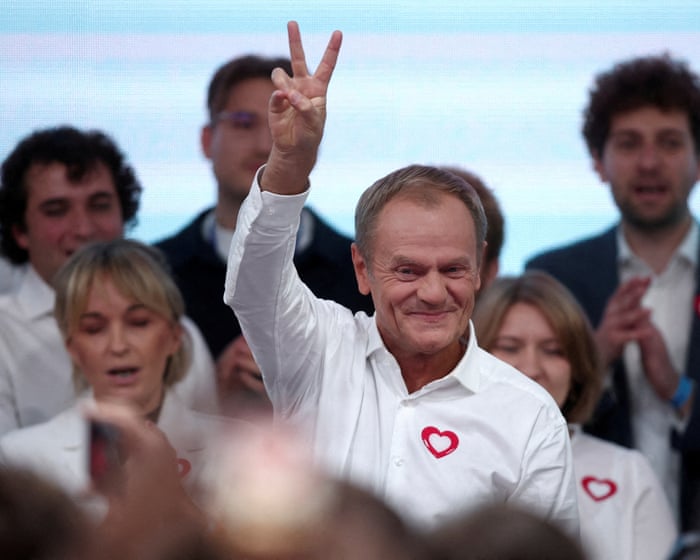Karolina Wigura and Jarosław Kuisz
We were traveling across Poland by train the day after the country’s dramatic parliamentary elections in autumn 2023. When the results came in, passengers in our compartment embraced each other, celebrating as if a heavy burden had been lifted. After eight long years, it was hard to believe—the national populists of the Law and Justice party had been voted out, with a record 75% voter turnout. The power of democracy to bring change felt almost tangible.
Yet less than two years later, that optimism has vanished. In June, Law and Justice-backed candidate Karol Nawrocki won the presidential runoff with 50.89% of the vote, earning praise from Donald Trump. Days before Nawrocki’s inauguration on August 6, a new poll showed nearly half of voters wanted Prime Minister Donald Tusk gone. The ruling coalition is faltering. Tusk’s liberal democratic government may end up as just an interlude—a brief pause between right-wing populist regimes.
After more than a decade of global populist resurgence, a clear pattern has emerged, and Poland is just one example. In countries where populists once ruled, disillusionment and anger often follow. In recent years, liberal candidates riding waves of opposition have toppled populists—before Tusk in Poland, there was Joe Biden in the U.S., Lula in Brazil, and Zuzana Čaputová in Slovakia. Their victories briefly seemed like beacons of hope for liberal democracy after the Cold War.
But rebuilding after populists leave office is like wading through political quicksand. Winning an election isn’t the same as winning the long game. The fight against populism is ongoing and global, fueled by digital media.
The challenge is even greater because populist governments leave behind legal chaos. In Poland, countless laws were designed to weaken democratic institutions. Undoing them legally and restoring the rule of law takes time and energy—forcing new governments to dwell on past mistakes rather than shaping the future. In Poland and Brazil, this has stifled any bold vision for progress. The initial euphoria fades fast, replaced by frustration and the resurgence of right-wing populism.
Since the Solidarity movement in the 1980s, Poland has been a testing ground for democracy. When Tusk returned to power in 2023, he faced a choice: reject his predecessors’ policies entirely or compromise with their legacy. He chose the latter. He kept the populists’ direct cash benefits for families, continued their controversial mega-transport hub project (which he once called wasteful), and failed to loosen Poland’s strict abortion laws, tightened by the previous government. Mimicking nationalist rhetoric on migration and border security, Poland even reinstated checks at its Schengen borders with Germany and Lithuania.
By letting populists dictate the political agenda, Tusk has set himself up for failure. After his candidate, Rafał Trzaskowski, lost the presidential race, support for Tusk plummeted in the polls. The lack of a compelling vision—or even a clear sense of what he stands for—is painful to watch.
If elections were held today, Poland’s right-wing populists would likely win in a landslide.If the opposition fails to win, PiS could return to power with an even more radical nationalist agenda. While Tusk is admired abroad as a strong defender of democracy, at home he has become one of Poland’s most unpopular politicians.
This is the Gorbachev syndrome—beloved internationally but disliked at home. Tusk’s declining popularity stems from broken promises, poor communication, and a weak presidential campaign. He also faces the global backlash against establishment politicians. To many Polish voters, especially younger ones, Tusk—who has been in politics for over 25 years and served as prime minister from 2007 to 2014—represents an outdated elite that should step aside.
Protecting democracy requires something liberal democrats have lacked: a bold vision for the future. Like Čaputová and Biden before them, Tusk and Lula have failed to deliver this. The message is missing, and the medium is tough—right-wing populists are dominating social and new media.
Poland’s situation shows the mistake of fighting elections defensively. Liberals must aim higher than just keeping populists out of power. Elections should be an opportunity to reshape democracy in a way that fits today’s media landscape. Without a forward-looking strategy, the liberal resurgence will be short-lived—just a brief pause in a longer populist era. Democrats must learn that defeating populism requires not just addressing the past but also offering a compelling future.
Karolina Wigura is a Polish historian and co-author of Post-Traumatic Sovereignty: An Essay (Why the Eastern European Mentality is Different). Jarosław Kuisz is editor-in-chief of the Polish weekly Kultura Liberalna and author of The New Politics of Poland: A Case of Post-Traumatic Sovereignty.



